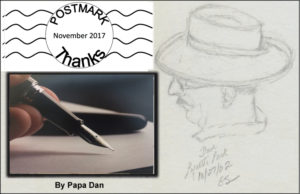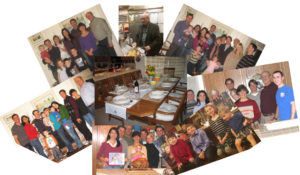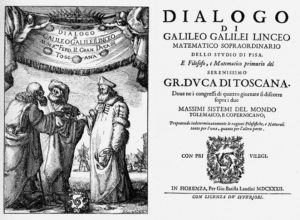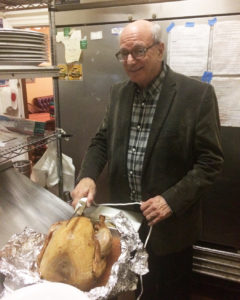Words of Thanks

“And yet it moves”
(in the original Italian: “Eppur si muove”).”
— Galileo Galilei,
Gentleman of Florence, 1632
Click here to download a PDF of this post: ConVivio_Thanks_TheSun_Nov16_2017
= = = = = = = = = = = = = = = = = = = = = = = = = = = = = = = = = = = = = = = = = =
“The Sun, with all its planets revolving around it and depending upon it,
still can find the time to ripen a bunch of grapes
as if it had nothing else in the universe to do.” — Galileo Galilei, 1632
This line first captured my imagination when I saw it on the back label of a bottle of red wine (where else would I look for memorable, meaningful words, eh?). I was looking for some wine for our Thanksgiving dinner table, the family was going to be there, and I would be offering a Thanksgiving Toast — I thought these words were perfect.
When the time came, with the bottle in my hand I mentioned that we all have so much to be thankful for: our families, our homes, the work we do, the people who are kind to us, the food and wine we enjoy, and the good times we have. Then, using Galileo’s words, I gave thanks for The Sun, representing all of the ‘greater powers’ that contribute to all of that goodness — whatever and whomever they might be. The words were fun, appropriate to the occasion, and they brought smiles. We lifted our glasses and said “Thanks’ to each other.
Galileo’s words helped us do that.

A Random Bunch of Thanksgiving Photos
Galileo’s Words In Context
So, if we let our minds drift back 385 years to Galileo’s time, we learn that he caused quite a kerfuffle, to say the least, when he first used these words. In a nutshell, in 1633, the Roman Inquisition wanted to torture him to death for saying these words. WHAT!!!??? Looking back with our 21stt-century eyes, it seems unlikely that the church fathers objected to the generous role of the Sun in producing wine grapes. And I suppose they weren’t threatened by the assertion that the Sun was capable of this level of multi-tasking. So, what was the problem?
The offense was that Galileo contradicted the church’s insistence that the Earth stands immovable at the center of the universe and that the Sun, and everything else, moves around the Earth every day. The Roman Inquisitors decided that Galileo’s conclusion, that the Earth moves, threatened the absolute power of the church. They said that his words were “foolish and absurd in philosophy, and formally heretical since it explicitly contradicts in many places the sense of Holy Scripture.” THAT was serious — serious enough to put Galileo on trial for his life.
So, how did it turn out? The outcome, seen through 21st-century eyes, was quite familiar. First, Galileo made the intellectual case. He said, initially, in his defense before the Inquisitors:
“I do not feel obliged to believe that the same God who has endowed us with senses, reason, and intellect has intended us to forgo their use and by some other means to give us knowledge which we can attain by them.”
In other words, does God really want us to deny what our “God-given” intellect reveals to us? In his treatise “Dialogue Concerning the Two Chief World Systems,” he went a bit too far:

“In the long run my observations have convinced
me that some men, reasoning preposterously, first
establish some conclusion … that impresses them
so deeply that one finds it impossible ever to get it
out of their heads.”
— from Galileo’s: “Dialogue Concerning the Two Chief World Systems”
Does that sound familiar? Well, as you might imagine, that approach failed. The Inquisitors made clear that these two arguments would lead directly to his torture and death. So, Galileo took another approach. He did exactly what he said he “did not feel obliged” to do — he denied what his intellect revealed. First, he admitted that he had, in fact, published a book that contained the offensive “false opinion.” He said that, despite the fact that he had presented “arguments of great cogency in its favor,” he settled the matter with the following statement:
I have been pronounced by the Holy Office to be suspected of heresy, of having believed that the Sun is the center of the world and immovable, and that the earth is not the center and moves. Therefore, … with sincere heart and unfeigned faith I abjure, curse, and detest the aforesaid errors and heresies, and generally every other error, heresy, and sect whatsoever contrary to the said Holy Church, and I swear that in the future I will never again say or assert, verbally or in writing, anything that might furnish occasion for a similar suspicion regarding me; but that should I know any heretic, or person suspected of heresy, I will denounce him to this Holy Office. Further, I swear and promise to fulfill and observe in their integrity all penances that have been, or that shall be, imposed upon me.”
So, that was THAT. Even in translation from the original Italian, it was a clear denial.
Well, modern scholars have re-examined the events of the time — notably David Hilbert who wrote in his defense of Galileo’s recantation:
“Galileo was no idiot. Only an idiot could believe that science requires martyrdom. That may be necessary in religion, but, in time, a scientific result will establish itself.”
Witnesses at this historic session with the Inquisitors reported (quietly, and to a select audience) that, after Galileo saved himself by admitting that the Earth does not move from its place at the center of the universe, rising from his knees to begin his house arrest, he was heard to mumble:
“Eppur si muove — And yet it moves.”
Finally, 359 years later, the Church agreed. At a ceremony in Rome, Pope John Paul II officially declared that Galileo was right. The formal rehabilitation was based on the findings of a committee the Pope set up in 1979. After a 13-year investigation, they decided that the Inquisition had acted in good faith, but was wrong. On October 31, 1992, a papal statement appeared in the New York Times:
“We today know that Galileo was right in adopting the Copernican astronomical theory.”
Oh, good for you!
What Did It Mean in 1633?
Was it a confrontation between science and faith? Historians and analysts over the past four centuries have said “No,” because Galileo never presented his science to the Inquisition. ‘Science’ wasn’t even present at the trial. It was about authority, at a time when the Protestant Reformation, at its peak in the 1630s, had questioned the whole notion of legitimate sources of authority. It wasn’t about the content of the science, or even logic; it was about “Who says?”
Little did any of them know, science would eventually have the last word. While the church insisted that the earth stood motionless at the center of the universe and Galileo reasoned that the Sun stood motionless at the center — turned out that not only is the Sun not still, everything is swirling around in a giant blender more vast than any of them imagined. Who knew?
Does It Mean Anything Today? (i.e., my usual “So what?” question)
Some have suggested that a similar “Who says?” argument is being waged today over matters in which science contradicts the sacred interests of today’s prevailing powers. Those folks argue that today’s arguments matter significantly more than the one that Galileo nimbly sidestepped back in 1633. Perhaps we’ve learned three things (there are always three): 1) that every age feels that its own struggles matter more than any that have gone before, 2) that such “Who says?” struggles are not likely to end any time soon, and 3) our experience teaches us that the right answer does eventually prevail. Once again, “the scientific result will establish itself.” In the meantime, the Sun still rises in the morning, it still does its important work in the vineyards and elsewhere, and it sets every evening, all as it is supposed to do. Often, though not always, that behavior continues without a lot of trouble for us humans. And for THAT, we may be thankful.
My Thanksgiving Toast Still Stands
“The Sun, with all its planets revolving around it and depending upon it,
still can find the time to ripen a bunch of grapes
as if it had nothing else in the universe to do.” — Galileo Galilei
I am thankful to THAT goodness for giving us all that we are and all that we have, especially each other. So many are not so fortunate and yet we have so much.
Happy Thanksgiving to you and yours!

The Turkey!
![]()
Notice: Undefined variable: time_since in /var/www/wp-content/themes/mts-journey/single.php on line 12
Friday, November 17th, 2017,
by Daniel and is filed under "Family Stories, Ideas, Who We Are ".
Both comments and pings are currently closed.
||
“What are you gettin’ at, Johnnie (er, Dan)?”
“And yet, it’s warmer (and colder and wetter and drier)!”?
Can you imagine what they would have done to Galileo if he had told them what coal would do to the climate? Although, I read that the Chinese were known to have used coal more than 3,000 years ago, the first recorded commercial mining of coal in “The West” occurred near Richmond, Virginia, in 1748. So, I guess Galileo missed it.
Happy Thanksgiving and thank you for this post. I am becoming more and more aware of those in our nation that don’t believe or won’t believe in what science has taught us in the last 360 years. A lot of it is lack of truthful education and most of it is peer pressure from whatever close-knit community they have locked themselves into. Building walls to protect what generations of these communities hold dear to their hearts also becomes that wall that inhibits education, discovery, and perhaps change of heart for the better. They are like any gene pool. Continual cross breeding creates a multitude of issues. Narrow mindedness breeds narrow mindedness. Money does not cure narrow mindedness, as illustrated by our current leader.
I would have thought that 359 years later there would be no doubt in anyone’s mind about the truths Galileo taught us. If every human on Earth would just pause and realize they are blessed to be here, and also have the courage to say that all these mostly religious rules and regulations written down thousands of years ago don’t apply any more. That was then and in many cases it failed. Give it up and come up with a plan that will work today. I’m not asking people to give up their heritage, I’m asking them to re-evaluate their tribalism, their hate, just because the family has been hating it for generations, Those that were hated are long gone. Don’t abandon your religion, but fix it so it works in 2017.
Don’t vote for someone because they are Republican or Democrat. Vote for what matters, what helps humanity. I’ve gotten long winded and have strayed off course, but making things right is important to me. I’m back on hormone therapy for my prostate cancer, so I think I may have a different perspective on life than a lot of folks. Hope I haven’t blabbed my way into rejection. Loved the blog.
Lew, my brother — thank you for daring to be long-winded. I appreciate it and thank you for it. I am pleased to call you brother, lo these many years (we met fifty years ago, you know). With this comment, I don’t think you’ve “strayed off course,” I think you have found a solid course that I hope others will follow. Cheers and Happy Thanksgiving to you and your magnificent wife and son.
Brother Dan
You hit on a key point in noting that the battle was not between science and faith but rather over authority. My own assertion (I suppose an act of faith) is that there cannot be an actual battle between true science and true faith since God is the author of both. Regardless, authority is a question of who has power over others. Science wins (i.e., gains ascendant power) only when it is true (which is to say, consistent with reality/fact). The same is true of religion. Good science recognizes that it is never final, because more information and a better understanding of the reality around us is always possible. That is a kind of humbleness that the Church of 1633 was, sadly, not capable of. Thus, ironically, science gains power when it is humble enough to recognize its limitedness, and the Church loses power when it forgets that. So I give thanks today for those, in science and religion, who recognize that they are limited and humbly offer the truth as they know it to a world that is then allowed to sort it out.
Well said, well reasoned, Dan.
Happy Thanksgiving Spumoni, no religious or scientific commentary, just a simple note of gratitude for all we have, and all we know. I’m glad that I know you and your nephew Joe.
And Thank you, Susan. We all go back a long way — back to Holy Rosary in the 50s and 60s when your mother taught us all to dance. Enjoy this day of Thanksgiving. And thanks to you for being the one who nicknamed me Spumoni — a fine Italian dessert.
— Spumoni